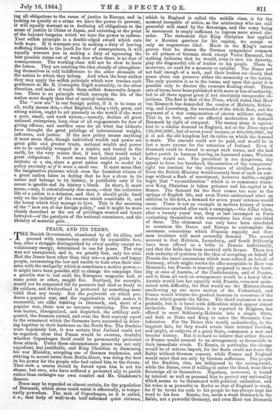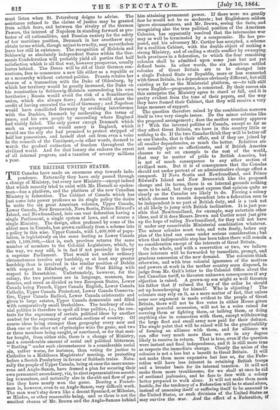PEACE, AND ITS TERMS. T HE Danish Government, abandoned by all
its allies, and pressed with remorseless severity by irresistible foes, has, after a struggle distinguished by every quality except re- volutionary energy, determined to sue for peace. The step was not unexpected, and is, we greatly fear, only too wise. Had the Danes been other than they are—a gentle and happy people, reverencing the law and unable to hate even their ene- mies with the malignity which is sometimes a motive power,— it might have been possible still to change the campaign into a guerilla war to last until the European magazine had, at some point or other, caught fire. Scotland, for example, would not be conquered till its peasants had died as freely as its soldiers, and Switzerland is protected by something more valid than any treaty. But the perfervida vis which pro- duces a popular war, and the organization which makes it successful, are alike wanting in Denmark, and, short of a popular war, there was no resource remaining. The army was beaten, disorganized, and dispirited, the artillery anti- quated, the finances ruined, and even the fleet scarcely equal to the armament which the Germans have succeeded in draw- ing together in their harbours on the North Sea. The Duchies were hopelessly lost, it was certain that Jutland could not be regained, clear that Funen would be overrun, doubtful whether Copenhagen itself could be permanently protected from attack. Under these circumstances peace was not only expedient, but justifiable, and King Christian in dismissing his war Ministry, accepting one of German tendencies, and striving to secure terms from Berlin direct, was doing the best in his power for the people who had raised him to the throne. That such a course should be forced upon him is not his shame, but ours, who have suffered a protected ally to perish rather than endanger our own comfort and Mr. Gladstone's finance. • Peace may be regarded as almost certain, for the population of Denmark, which alone could resist it effectually, is tempo- rarily powerless. The mob of Copenhagen, as it is called, d. e., that body of well-to-do half-informed quiet citizens, which in England is called the middle class, is for the moment incapable of action, as the aristocracy who are still powerful will stand by the Sovereign, and the army being in movement is amply sufficient to repress mere street dis- order. The statement that King Christian has applied for a Russian garrison for his capital, we accept as only an ungenerous libel. Much in the King's career proves that he shares the German sympathies common to all princes of German stock except Victor Emanuel, but nothing indicates that he would, even to save his dynasty, play the disgraceful rdle of traitor to his people. There is, moreover, no need for a measure so suicidal. The Danes are not half enough of a mob, and their leaders see clearly that peace alone can preserve either the monarchy or the nation. The only question is as to the terms, and upon this point it is possible only to discuss the rumours floating about. Three sets of terms have been published with more or less of authority, but to all there appear great if not absolutely insuperable ob- jections. The first is that of the Times, which states that Herr von Bismarck has demanded the cession of Holstein, Schles- wig, and Lauenburg, the surrender of the whole fleet, and the payment of a war compensation of eleven millions sterling. That is, in fact, under an affected moderation to demand Denmark by right of conquest. The money alone is equiva- lent to a similar demand on England, not as the Times says of 150,000,0001., but of seven years' income, or 490,000,0001., for it is not the old kingdom but its relics on which the demand is made. The amount could not be paid, and would be in fact a mere excuse for the retention of Jutland. Even if Denmark could be forced to accept such terms, and she had better perish in harness leaving an honoured name, Western Europe would not. The precedent is too dangerous, the appeal to force too barefaced, the assertion of the conquerors' right too insolent for the endurance of civilized powers. Even the British Ministry would scarcely hear of such an out- rage without a flash of resentment, however feeble,—might begin that " reconsideration " which is to commence when- ever King Christian is taken prisoner and his capital is in flames. The demand for the fleet comes too near to the springs of English life, and even Tories understand what an addition to the debt, a demand for seven years' revenue would mean. There is not an example in modern history of terms so atrocious exacted after such a campaign,—the Allies when, after a twenty years' war, they at last encamped in Paris contenting themselves with concessions less than one-third of these. The statement can only have been circulated to accustom the Danes and Europe to contemplate the enormous concessions which Prussian rapacity and . Ger- man insolence will most assuredly demand. The second account is that Holstein, Lauenburg, and South Schleswig have been offered as a bribe to Prussia individually, and that the bribe has been received with favour. There is a rich audacity of cynicism in the idea of accepting on behalf of Prussia the exact concessions which were refused on behalf of Germany, which might render the offer acceptable to Herr von Bismarck, but Prussia is scarcely prepared to meet the hosti-. lity at once of Austria, of the Confederation, and of France, and to them all such an arrangement would be a heavy blow. Austria would lose her equality with Prussia, even now main- tained with difficulty, the Diet would see the Hohenzollerns swallowing up one more section of the Fatherland, and France would witness the gradual increase in resources of the Power which guards the Rhine. The third statement is more probable, but it is beset with difficulties which appear almost invincible. King Christian, it is reported in Belgium, has offered to erect Schleswig-Holstein into a single State, and both as Duke and King to enter the Germanic Con- federation. For the Danes this would, undoubtedly, be the happiest fate, for they would retain their internal freedom, and might, as subjects of a great State, commence a new and broader history. But it is hard to believe that either Russia or France would consent to an arrangement so favourable to their immediate rivals. To Russia, in particular, the change would be of serious import, for her fleets could not leave the Baltic without German consent, while France and England would enter that sea only by German sufferance. The people of the Duchies, also, are indisposed to the arrangement, while the Danes, even if willing to enter the Bund, want their Sovereign all to themselves. Napoleon, moreover, is bound by interest as well as personal bias to protect any nationality which seems to be threatened with political extinction, and his voice is as powerful in Berlin as that of England is weak, for if he broke his oath to his people he has always kept his word to his foes. Russia, too, needs a weak Denmark in the Baltic, not a powerful Germany, and even Herr von Bismarck































 Previous page
Previous page